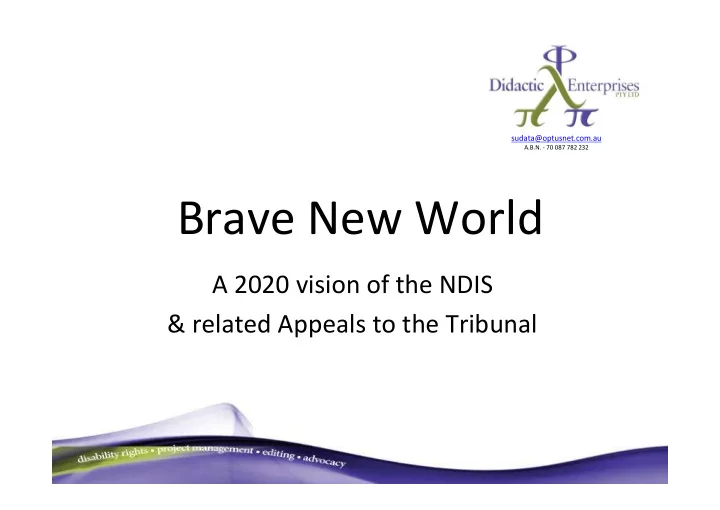

sudata@optusnet.com.au A.B.N. - 70 087 782 232 Brave New World A 2020 vision of the NDIS & related Appeals to the Tribunal
The largest Social Policy Reform since Medicare … . FROM 2011 PC “ Disability Care & Support ” Report Disability supports are: • Inequitable, underfunded, fragmented & inefficient, giving people with disability little choice TO 2018 Commonwealth Ombudsman ’ s report NDIS disability support system is: • Unwieldy, unapproachable and driver of substantial complaint volumes for participants
Current age distribution of NDIS Participants in the ACT
SDAC 2015 age distribution of people with profound/severe impairment in the ACT
Projected age distribution of NDIS Participants over time
Estimate of age distribution NDIS participants by 2020
Major Sticking Points Plan Reviews • Interface issues – Health/Disability – My Aged Care/NDIS – Jurisdictional (x-border issues) • Subjective interpretations of the Act Reasonable & necessary Choice & Control Early Intervention Psychosocial Housing
Plan Reviews • National - 32.5% of NDIS-related complaints • ACT - 95%+ of NDIS related problems • Urgent need to reduce the plans going to review e.g. Participant Pathway under review similar need for Plan Review Pathway review • Reasons for review requests Plan contains Planner errors (funds in wrong bucket) Plan contains inadequate funds for AT (quotes supplied/ignored/rejected) Plan contains unauthorised & uncommunicated change in plan management Plan approval delays mean requirements have changed
Reducing reviews • Transparency – communication & trust needed • Backlog of review requests (Feb 2018 = 8200, with 600+ new per week) • Review requests under s48 and s100 • Ombudsman identified that Planners classed requests for internal review interpreted as request for unscheduled review. • Wrong process, prevented Participant going to AAT in the first instance • Causes double handling
Health/Disability interface • Eligibility (e.g. Dale Mulligan case, sciatica/heart disease, with request for lawn mowing) • Increased need for modifications • Increased need for ADL supports • Increased dual diagnoses (Primary disability & Mental Health condition ) (loss of existing mental health services rolled into the NDIS, only 35% eligible for NDIS) • State government withdrawal of services (e.g. ACT no longer a provider of last resort available)
My Aged Care/NDIS interface • Lack of parity between My Aged Care & NDIS e.g. NDIS Guide Dog care = $2500 p.a., MAC allocation = $0. • Definition of Chronic condition • Clear linkage to health system • Medical model • What you pay for assess supports is means tested • Disability acquired at aged 64
Jurisdictional interface • Price differentials will continue • Due to cost of living and cost of labour • Rural and remote areas will have thin markets WHAT WILL HAPPEN … . • When Jane Smith moves from a high cost of living area (reflected in higher level of funded supports) • To a low cost of living area, which she has chosen in order to get Value for Money for her package, • And her package is then reduced at Plan Review • She is sure to request a review of that decision.
Subjective interpretations of the Act: ‘ reasonable and necessary ’ The objects of this Act are to: (d) provide reasonable and necessary supports , etc BUT • …… due to the degenerative nature of your condition we do not think that bathroom renovations are value for money. - 30 year old mother with CMT
Reasonable & necessary supports should : Support people with disability to: (a)pursue their goals & maximise independence; (b)live independently & be included in the community as fully participating citizens; (c) develop & support the capacity to undertake activities that enable them to participate in the community and in employment.
Value for Money The costs of the support are reasonable: Benefits Cost of achieved alternative VS supports • the support will be, or is likely to be, effective and beneficial for the participant, having regard to current good practice; • Once a support is held to be reasonable & necessary support, it should be fully funded (Perosh)
Subjective interpretations of the Act: ‘ choice & control ’ Objects of the Act (c) enable people with disability to exercise choice and control in the pursuit of goals and planning/delivery of their supports General Principles guiding actions under this Act #8. People with disability have the same rights as others, • determine their own best interests, • the right to exercise choice and control, • the right to engage as equal partners in decisions that will affect their lives #9. People with disability - supported in dealings/communications with the Agency, so that they have maximum capacity to exercise choice & control
Subjective interpretations of the Act: ‘ early intervention ’ • S25.1.b. Early intervention supports – reduce the person ’ s future needs for supports in relation to disability • S25.1.c.i. … mitigating or alleviating the impact.. on functional capacity • Ominous note – in certain circumstances a person with a degenerative condition could meet the early intervention requirements and therefore become a participant • S26.3. the CEO may determine that needs are best met elsewhere • S28.f. improving the capacity of the carer to continue
Subjective interpretations of the Act: ‘ psychosocial ’ S24.1.c. Disability Requirements The impairment result in substantially reduced capacity to undertake, or psychosocial functioning in undertaking, one or more of: i. Communication ii. Social interaction iii. Self-care iv. Self-management
Housing • Specialist Disability Accommodation forcing people into group house situation • Only a very small number of a very small percentage of Participants will be funded to live alone in SDA • Funding may not be adequate even when the ‘ house ’ is in a complex where shared supports are possible • Against Human Rights, ability to choose, independence
sudata@optusnet.com.au A.B.N. - 70 087 782 232
Recommend
More recommend